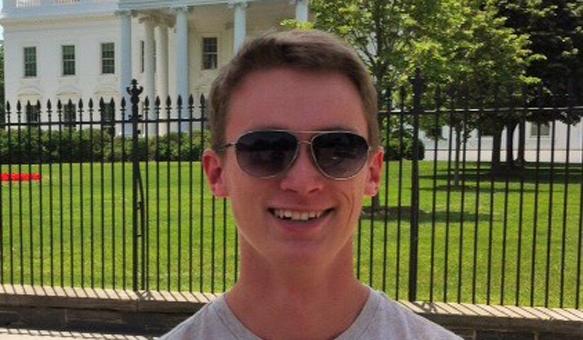Sweeney’s experience began with an email sent to all pre-political science students informing them of an opportunity to work with the White House Associates Program. Although a freshman at the time, Sweeney decided to apply. After submitting the application, Sweeney received an invitation for a phone interview and was shortly after accepted into the program.
“For any other student, I would be surprised that a freshman would receive such a prestigious internship, but I was not surprised Dana was selected,” said Richard Fording, a professor of political science at the University. “He is one of the best students I have taught in 18 years.”
Sweeney credits much of his success with the application to Fording, who first notified the students of this opportunity and encouraged him to apply even when Sweeney said he felt his own chances as a freshman were unlikely.
During his time in the program, Sweeney lived the entire summer in Washington, D.C., working in the White House Office of Presidential Correspondence. Sweeney also participated in UA in D.C., a program for UA students in the capital, created and directed by UA professor Michael New.
The associates for the Office of Correspondence were tasked with sorting through emails and letters sent to the White House from American citizens and assisting people who called the office to share how they are affected by political situations and policies. Associates spent their time reading these personal accounts and sending out appropriate responses on behalf of the office.
Beginning at 8 a.m. and ending many times after 6 p.m., Sweeney’s work was largely consistent day-to-day.
“Most of [the work] was typical office work – sorting things, scanning things, keeping records – but also having the opportunity to look at some of the mail coming in and making sure the people were getting the responses they were looking for,” Sweeney said.
While the work settled into a routine, Sweeney said he was quick to find meaning in his position.
“It’s definitely something I am still processing today,” he said. “Reading the unfiltered concerns of the American people, there were some very raw experiences that would come from the people through the Office of Correspondence. I think it definitely recommitted me to the idea that government has the capacity to really make a difference in people’s lives – for better and for worse.”
Twice while working, Sweeney was invited to see the president speak – once to give remarks on the crisis in the Ukraine and another time on infrastructure and spending bills at Georgetown University. While attending the Georgetown University speech, Sweeney seized the opportunity to shake the President’s hand.
“That moment that I got to shake his hand was certainly not something I’d ever expect when I went there,” he said. “That was – I don’t know – just a moment that I’m not going to forget for the rest of my life.”
In addition to encounters with the president, Sweeney had the chance to engage with Supreme Court Justice Elena Kagan in a private meeting arranged by New. Justice Kagan gave a testimony, and participants had a chance to ask her questions. Sweeney asked a question he said he often asks people he admires: “What’s a book that has been really influential in your life?”
The justice said she did not have an answer, and in turn, asked Sweeney for his recommendation. Sweeney recommended the justice read “Cloud Atlas” by David Mitchell.
Also while in D.C, Sweeney went on behind-the-ropes tours of the West Wing, including the Oval Office, Cabinet Meeting Room and the White House Press Room and saw Marine One, the president’s helicopter, take off from the south lawn of the White House. Sweeney also bowled at the Truman Bowling Alley in the White House.
From an early age, Sweeney said he has had an interest in politics. As a second grader, he subscribed to Time Magazine. Sweeney’s interest in English and politics is fed by a variety of sources.
“I study English to better understand people, and I study politics to better understand how people interact and organize themselves,” Sweeney said.
Sweeney hopes to join New College with intentions to create a major focusing on international security and sustainability. He is a participant in 57 Miles, a Spark mentor and a Creative Campus intern. This summer he designed a curriculum for seventh graders in underprivileged parts of Alabama on theater and creative writing. He said he hopes to expand the program this year to include regional poetry slams for high school students across the Black Belt.
Sweeney said he is not completely certain where his interests are taking him, though he said he feels his summer experiences have impacted his future greatly.
“I don’t think it has narrowed my search for what I want to do with my life, but I think it gave that search a great deal more context,” he said. “It’s definitely a search that I’m still on, but I think a search that has become better for having this incredible experience.”









